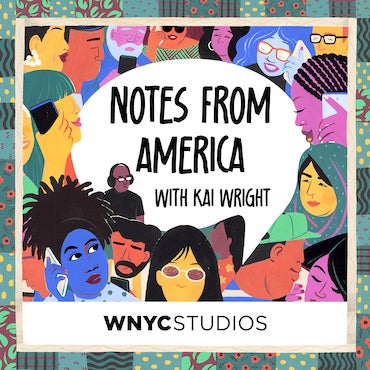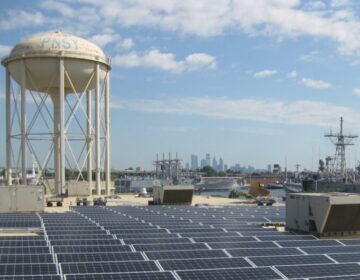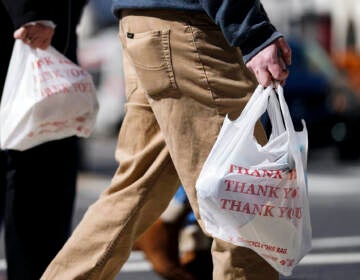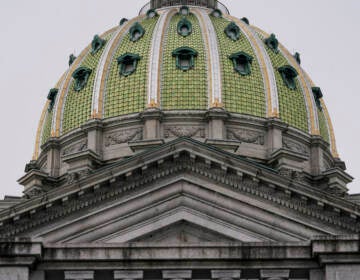Philadelphia, suburban towns sue state over moratorium on plastic bag bans
The city, along with Lower Merion, West Chester and Narberth, say the state’s 2019 moratorium violates the state constitution.
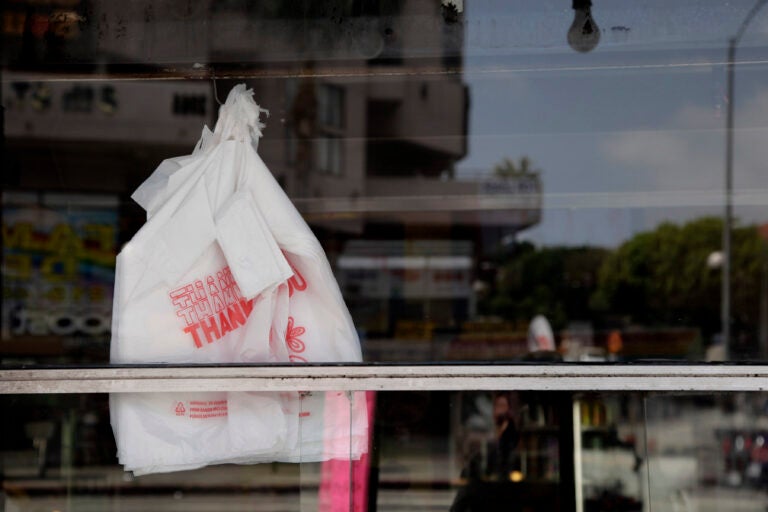
Starting July 1st, businesses will be required to post informal signage alerting customers that the City's plastic bag ban will go into full effect in October. (AP Photo/Jae C. Hong, File)
Updated 4:53 p.m.
Saying state lawmakers acted in an “undemocratic” manner, the City of Philadelphia, in conjunction with Lower Merion Township and the Boroughs of West Chester and Narberth, have filed a lawsuit in Commonwealth Court challenging the state legislature’s moratorium on municipal plastic bag bans. The suit cites both the Environmental Rights Amendment and the “single subject rule” of the Pennsylvania Constitution. The constitutional provision prevents lawmakers from passing bills containing more than one subject, except in the case of an appropriation bill. The state constitution also requires the title of a bill to reference its subject matter.
“In Philadelphia and across the commonwealth, local governments are increasingly concerned about the health and environmental effects of plastic bags,” Mayor Jim Kenney said in a statement. “Yet, once again, we face a state legislature that is focused more on tying the hands of cities and towns than on solving the actual problems facing Pennsylvania. We are finding local solutions to local problems, and this suit is important in declaring our right to do so on this and many other issues.”
Last summer, lawmakers extended a 2019 moratorium on plastic bag bans by inserting it into the fiscal code (HB1083) just hours before a full vote, with little debate and no public hearing.
The measure was tucked between parts of an amendment on how to spend state gambling proceeds. It prohibits municipalities from enacting any fees or restrictions on all single-use plastics such as bags, utensils or styrofoam containers. Lawmakers said they needed to study the impact of such bans.
In addition, the measure delayed implementation of any current plastic bag bans, such as those passed in Philadelphia, West Chester and Narberth, at least until July 1, 2021, or six months after Gov. Tom Wolf lifted the COVID-19 state of emergency. Under the current state of emergency, that would delay the implementation of the municipal bans at least until November of this year. In the case of Lower Merion, the lawsuit says it prevents the township from enacting a ban on single-use plastics. Despite the fact that the current moratorium would force the city to delay implementation until November, Philadelphia officials say they still plan to enact the bag ban July 1, followed by an education campaign, with enforcement beginning in October.
Lawmakers had tried and failed to pass a freestanding ban in previous years.
Though the current moratorium has an end date, PennEnvironment director David Masur said there’s nothing to stop the legislature from extending it.
“The sad political reality is the legislature will keep using this nefarious way to stop local governments from tackling plastic pollution,” said Masur. “The idea that they’re using this backroom action to take away local control, it’s an egregious way to undermine democracy.”
Enacted in 2019, Philadelphia’s bag ban was set to begin the first of this year, but Mayor Jim Kenney announced in December that it would be delayed by six months. It was the second such delay, which the mayor said was due to impact of the pandemic on businesses.
At the time the moratorium passed the Pennsylvania legislature last summer, Republican lawmakers cited concerns about the spread of COVID-19. But current research reveals little risk from surface spread of the virus, including plastic bags. The plastics industry had claimed the risk was high early on in the pandemic.
Another motivating factor for the moratorium on bag bans is plastic industry jobs. State Rep. John Hershey (R-Juniata County) supported the measure, saying hundreds of families’ livelihoods are tied to the Novolex plant in Milesburg.
On Wednesday, a spokeswoman for Republican State Sen. Jake Corman said that the desire of local municipalities to enact bans on single-use plastic should be balanced with economic impacts, including the loss of jobs.
“Many of the preconceived notions about single-use plastic bags are not based in the reality of customer re-usage of the bags or the manufacturing process that continues to make improvements in order to reduce its environmental footprint,” spokeswoman Jennifer Kocher said in an email. “Two independent studies commissioned by the General Assembly that are specific to Pennsylvania show that changes to bag policies would not have the positive environmental impact people want but will negatively impact our local economies.”
While eliminating plastic pollution benefits the environment, studies show that replacements for those bags, such as paper or cotton, can have just as large, or in some cases larger, carbon footprints than single-use plastics. Still, advocates say the plastic waste sticks around much longer.
The low price of natural gas also has that industry moving more toward plastics manufacturing. Shell is building a large manufacturing plant, or ethane cracker, in southwestern Pennsylvania to tap into the abundance of shale gas that can be used as a feedstock for plastics. The 300-mile-plus Mariner East natural gas liquid pipeline project ships Marcellus Shale gas across the state to an export terminal in Delaware County, where it is then exported to a plastics plant in Scotland.
City Councilmember Mark Squilla, the original sponsor of Philadelphia’s plastic bag ban, spoke at the city’s announcement of the lawsuit and acknowledged the influence of the plastics industry lobby.
“But we’re looking at the big picture of how these companies can reinvent themselves, and make different types of items to keep people employed,” he said. “In this process, we don’t make everyone happy, we will keep an open dialog.”
Philadelphians use an estimated 1 billion plastic bags a year, according to Clean Air Council attorney Logan Welde. Many of them end up as litter on city streets, trees, and waterways, and can cost millions of dollars each year to clear from the city’s wastewater treatment facilities and recycling centers.
As so much of the city’s litter ends up in communities of color, it’s also an environmental justice issue.
“Litter is both an environmental and racial justice issue, and we have to resist being a dumping ground for cheap petrochemical products such as plastic bags,” said Shari Hersh, director of environmental justice for Mural Arts Philadelphia.
Much of that plastic trash gets broken down into tiny pieces called microplastics, which are then released up into the atmosphere, according to a recent study. Microplastics are so ubiquitous that some have begun referring to the current era in history as the Plasticene. Research into the impact of such toxins on public health is unclear, but that doesn’t mean researchers don’t think there is cause for concern. A report released Wednesday by PennEnvironment revealed the presence of microplastics in many of the region’s creeks, rivers and streams.
A spokesperson for Attorney General Josh Shapiro said that the office has received the city’s lawsuit, and that it “will begin evaluating their claims.”
Jason Gottesman, a spokesman for the House Republican Caucus, defended the constitutionality of the legislation, saying the budget bill passed with overwhelming bipartisan support.
“Right now, the City of Philadelphia is in the middle of a bungled vaccine rollout, streets riddled with violent crime, and shuttered businesses as a result of Gov. Wolf’s and Mayor Kenney’s ridiculous economic shutdowns,” Gottesman said in an email. “The city should focus on these serious self-created problems rather than wasting taxpayer money on ridiculous lawsuits.”

Get daily updates from WHYY News!
WHYY is your source for fact-based, in-depth journalism and information. As a nonprofit organization, we rely on financial support from readers like you. Please give today.

